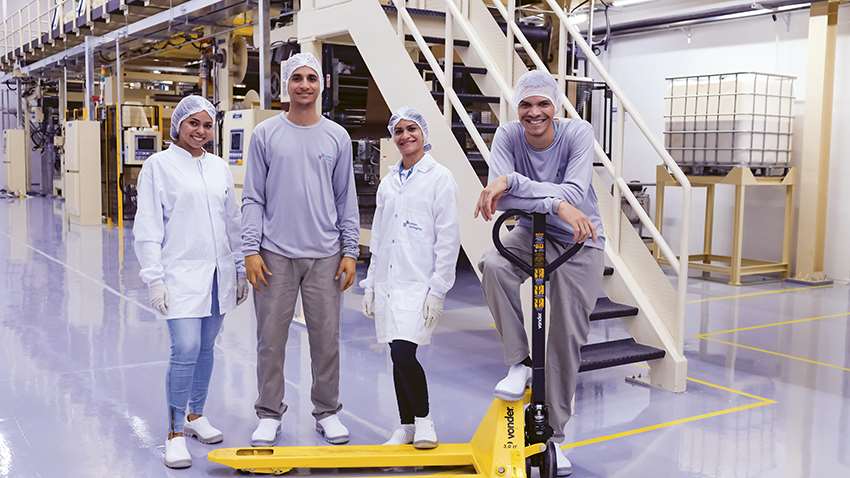Packaging
EBIT margin back in double digits

The Packaging Division was able to pass the bulk of its increased raw materials and transport costs on to the market, and raised its net sales 35.1% to CHF 231 million. EBIT for the year was quadrupled to CHF 24 million.
Strategy
The Packaging Division pursues two strategic thrusts. The first of these is to ensure effective geographical coverage of the most important pharmaceutical markets in Europe, Asia and Latin America. The leading players in the pharmaceutical industry are all globally active and maintain production facilities on various continents. To offer these and more locally-based pharmaceutical companies local solutions for their packaging needs, Perlen Packaging has invested in coating and slitting plants in Europe, China and North and South America over recent years. With the entry into operation of the new coating plant in Brazil in the fourth quarter of 2022, the division has expanded its capacities by a further 20%, and will be able to provide the markets in Latin America directly with locally produced mono and coated films. The division is now well equipped with its own capacities in the ‘pharmerging markets’, and is thus well positioned to share in their stronger-than-average growth.
The second strategic thrust is a clear focus on films with high-barrier properties within the product range. The active ingredients used in medicines are becoming ever more complex, and the medicines concerned are increasingly marketed globally in all climate zones. To ensure that the tablets and capsules contained in blister packs are optimally protected from external influences such as water vapour and oxygen, the packaging films used in them feature multiple layers. Perlen Packaging offers a full range of PVC and PVdC films for the pharmaceutical industry, and is a market leader in today’s high-barrier film segment.
Most blister packs consist of two components: a coated plastic film which is thermoformed to accommodate the individual medicines, and an aluminium cover film through which the medicine is pushed. The combination of plastic and metal makes such blister packs harder to recycle than all-plastic packs would be. In view of this, Perlen Packaging is currently developing recyclable alternatives.
Market environment
Demand for pharmaceutical packagings was high in the year under review. The coronavirus pandemic and the war in Ukraine prompted a rethink among industry customers, especially in Europe. While short order and delivery times had previously been the norm, many clients feared further supply disruption as a result of shortages of raw materials or transport capacities. In response, the pharmaceutical manufacturers opted to build up their inventories of packaging films, and also secured future deliveries well in advance. The markets in Asia showed below-average growth. The COVID-19 measures taken by the government in China dampened the local economic mood and prompted delivery delays.
The situation in the procurement markets remained very tight up to the late summer months. Raw materials such as PVC, PVdC, adhesives and other auxiliary materials were declared subject to ‘force majeure’ and rationed by their suppliers, which made the timely manufacture of products ordered a challenging undertaking. Transport and energy costs also rose to ever-new record highs. Only in the fourth quarter of the year could a slight easing be seen.
Business development
Perlen Packaging’s production facilities were very well utilized, and were operated at the limits of their capacities. The new coating plant in Brazil came into operation in the fourth-quarter period, and will now provide further production capacity. The division also concluded a new exclusive PVC mono film supply agreement with local Brazil-based film manufacturer Cipatex in the course of the year.
Total sales volumes for the year were up on 2021; but the 35.1% rise in net sales to CHF 231 million was primarily attributable to the greater share of higher-value products in the sales mix and to the price increases effected. Net sales increased 39.0% at constant currency. Double-digit net sales growth was achieved in all regions except Asia.
The division was largely able to pass on the increased raw materials and transport costs to the market, and EBITDA was raised CHF 19 million to CHF 31 million. EBIT was quadrupled to CHF 24 million, and EBIT margin recovered to 10.3%. The division invested CHF 8 million in its fixed assets in 2022, most of it in the new Brazilian production facility. Personnel numbers rose from 449 to 507 – also largely as a result of the expansion in Brazil, where 49 employees had joined the payroll by year-end.
Outlook
The IQVIA research company expects the global pharmaceutical blister pack market to grow in value by between 3% and 6% a year over the next few years. The Packaging Division plans to invest some CHF 14 million in 2023 in further expanding its slitting and packaging capacities in Europe and North and South America.
The division aims to achieve above-market growth in 2023, and expects to report higher net sales for the year in constant-currency terms. Provided higher raw materials prices can continue to be passed on to the market, EBIT should correspondingly improve.
